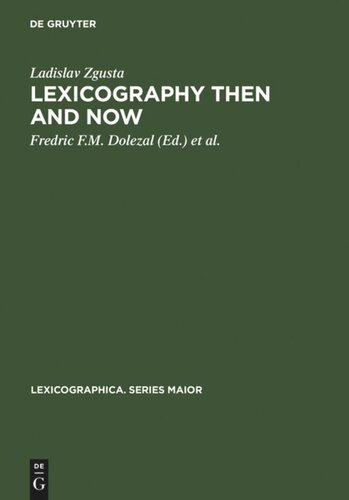

Most ebook files are in PDF format, so you can easily read them using various software such as Foxit Reader or directly on the Google Chrome browser.
Some ebook files are released by publishers in other formats such as .awz, .mobi, .epub, .fb2, etc. You may need to install specific software to read these formats on mobile/PC, such as Calibre.
Please read the tutorial at this link: https://ebookbell.com/faq
We offer FREE conversion to the popular formats you request; however, this may take some time. Therefore, right after payment, please email us, and we will try to provide the service as quickly as possible.
For some exceptional file formats or broken links (if any), please refrain from opening any disputes. Instead, email us first, and we will try to assist within a maximum of 6 hours.
EbookBell Team

4.3
78 reviewsProfessor Zgusta’s work in lexicography and linguistics proper is built upon a multilingual command of linguistic theory, literary history, the history of linguistics, and his experience as a ›practical‹ lexicographer. The topic under consideration may be the organization and development of a standard variety of a language; explorations of the consequences of linguistic theory on the practical lexicographic applications in making dictionaries that range from Ahtna to Zoque and Batad Ifuagao to Yolngu-Matha; the method of definition in bilingual dictionaries; the state of affairs in Russian lexicography; learner’s dictionaries; ancient Greek lexicography; pragmatics; scripts and morphological types; the history of English lexicography; or behind the scenes at the making of the Czech-Chinese dictionary. The reader will not only be offered a careful and wide-ranging study of these important topics in the discipline, but will be taken on a guided comparative and historical tour that illuminates the strengths and weaknesses of current practice and theory. His work reminds those linguists and lexicographers who are locked into ›paradigm‹ battles of the Kuhnian kind that the wheel has already been invented. Most of the articles in this volume have been updated. The editors have also conflated six articles on the history of dictionaries into one seamless narrative with connective tissue supplied by Zgusta.